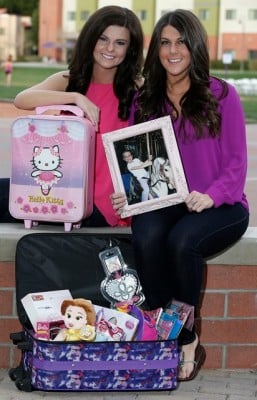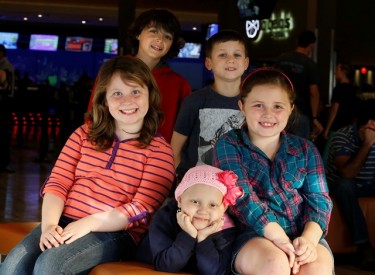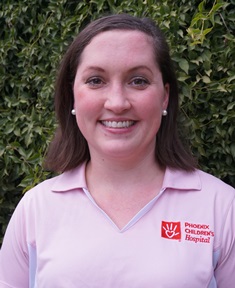By Janie Magruder
GCU News Bureau
Life was too short for McKenzie Monks.
A born performer, youngest child of Denise and Richard Monks and part of a mutual admiration society with her two older siblings, McKenzie was diagnosed with kidney cancer at age 3. Despite aggressive treatments, she died before she could get to kindergarten.
“She went through so much and her life was taken far too soon,” said sister Mandy Monks, a student at Grand Canyon University. “The lessons she taught us — to always be grateful for your blessings and tell the people you love — changed our entire outlook on life. We wanted to do something to have her name live on.”
Ten years ago, the family started the McKenzie Monks Foundation, which has donated $1 million to open the Kenzie Center in Phoenix Children’s Hospital’s (PCH) Center for Cancer and Blood Disorders and has given 2,000 wheeled suitcases filled with age- and gender-appropriate toys and comfort items to children diagnosed with cancer there. Called Kenzie Kases, the suitcases are patterned after McKenzie’s pink Hello Kitty bag that she took to the hospital for every treatment.
The Monks plan to join an estimated 4,500 people on GCU’s main campus for the fifth annual GCU Foundation Run to Fight Children’s Cancer this Saturday. In its first four years, the event raised nearly $275,000 to benefit PCH and the Children’s Cancer Network (CCN), a nonprofit organization that helps Arizona families battling childhood cancer. The fundraising goal this year is $150,000.
“The run has helped to increase awareness of childhood cancer and put CCN on the map as a valuable resource for families from the moment of diagnosis, throughout treatment and into long-term survivorship,” said CCN executive director Patti Luttrell, an adjunct faculty member in GCU’s College of Nursing and Health Care Professions.
“Thanks to the run, we have been able to respond to the increased need for basic necessities for these families — gas and food cards, bus and cafeteria passes, beds and linens, household items and more.”
Filling a gap for families fighting cancer
Luttrell, of Tempe, never wanted to be an expert on childhood cancer. Her son, Jeff, was diagnosed with leukemia in 1993 at age 5, and he has since gone nine rounds with cancer, including four with a secondary cancer of the mouth.
“It seems like his whole life has had some component of cancer, almost at every turn, and it’s heartbreaking,” she said. “And yet it’s important not to let cancer control you, and Jeff’s courage and resilience and amazing determination to get through the next steps have been so helpful. He gives me inspiration to not let it control us.”
Luttrell, her husband, Steve, and their daughter, Jenny, are fortunate to have had the financial wherewithal and insurance coverage to care for Jeff over the years, and they had a good support network. Many families they met, however, didn’t have those advantages, and that’s why CCN was created. It gives financial assistance, education and encouragement to families in every stage of cancer, from diagnosis to long-term survival, and it funds research for better diagnosis tools and treatment options.
Jeff, 26, is back in school this semester, following his most recent surgery in December, and is working on a degree in graphic design from The Art Institute of Phoenix. As he has grown, CCN’s goals have expanded into smoothing the transition that cancer patients face as young adults, where medical and support services seem less collaborative than in pediatric oncology.
Powering through adversity
When Sarah Maurer turned 26 and was aged out of her parents’ health insurance, she turned to the state Medicaid system for coverage. She had no choice: Maurer has multiple appointments every year with nine physicians who track the health of her heart, lungs, brain, kidneys, bones and endocrine system, among others.
In 1992, just before her eighth birthday, Maurer was diagnosed with Wilms’ tumor, the same cancer that killed McKenzie. She endured intense radiation and chemotherapy and, as a result, her health must be closely monitored for the rest of her life.
During Maurer’s treatment, she often was angry or upset, and the only time she would cooperate or open up about her feelings was when she was with the hospital’s pet therapy rabbit, Thumper. The care she received from the staff made such an impression that she now works as a child-life specialist at PCH.
“I want them to know to never give up, to find something that they enjoy doing and can do and run with it. They should keep living life and never let it hold them back,” said Mauer, 30, of Phoenix.
McKenzie Monks’ time on earth was brief but well-lived. When her hair fell out, she refused to wear a wig, instead rubbing her bald head with glitter. “She never noticed she was different,” said Mandy Monks. “She just wanted to sparkle, which she did.”
McKenzie’s death not only changed her sister’s outlook on life, it’s having an impact on her future. After earning a degree in family and human development at Arizona State University, the 24-year-old Phoenix resident ienrolled in GCU’s undergraduate nursing program.
“Cancer definitely changes you once you see the other side of it.”
Pushing for better tools
When Jeff was 12, during a follow-up visit after his bone-marrow transplant at a Tucson hospital, the Luttrells wandered into a playroom and saw a live donkey there. Seeing no one else in the room, they approached the animal to pet it, and to their surprise, a small hand with an IV in it reached around from behind.
“‘This has got to stop,’ Jeff said to us when he saw the child,” Luttrell recalled. “He was talking about the next generation of cancer patients, not his own.”
In 2013, when Luttrell asked Jeff if he wanted to speak at a fundraiser that CCN hosts annually, a large springtime fashion show and silent auction at The Phoenician, he again declined.
“And he said, ‘When you all get serious and start funding research, then I’ll talk,’” she said.
Last year, CCN announced a $100,000 pledge to PCH’s Ronald A. Matricaria Institute of Molecular Medicine to search for improved treatment methods for Acute Myelogenous Leukemia. The eventual hope is for early diagnosis, prevention and cure of this aggressive blood cancer.
“Hope is the root of all of it,” Luttrell said of her 21-year road with cancer. “It’s what gives us the courage to move forward. Jeff has never lost that hope, and I want other families to find hope, too.”
Contact Janie Magruder at 602-639-8018 or [email protected].






































































